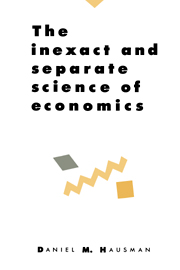Book contents
- Frontmatter
- Contents
- List of figures
- Dedication
- Introduction
- Part I Introduction, structure, and strategy
- 1 Rationality and utility theory
- 2 Demand and consumer choice
- 3 The theory of the firm and general equilibrium
- 4 Equilibrium theory and economic welfare
- 5 Models and theories in economics
- 6 The structure and strategy of economics
- 7 Overlapping generations: a case study
- Part II Theory assessment
- Part III Conclusion
- Appendix: An introduction to philosophy of science
- Bibliography
- Index
7 - Overlapping generations: a case study
Published online by Cambridge University Press: 04 August 2010
- Frontmatter
- Contents
- List of figures
- Dedication
- Introduction
- Part I Introduction, structure, and strategy
- 1 Rationality and utility theory
- 2 Demand and consumer choice
- 3 The theory of the firm and general equilibrium
- 4 Equilibrium theory and economic welfare
- 5 Models and theories in economics
- 6 The structure and strategy of economics
- 7 Overlapping generations: a case study
- Part II Theory assessment
- Part III Conclusion
- Appendix: An introduction to philosophy of science
- Bibliography
- Index
Summary
In this chapter I shall present a case study to illustrate and clarify the notions of theory and of model developed above and to make more concrete the general claims in chapter 6 concerning the character of the neoclassical theoretical enterprise. I shall focus on a celebrated paper by Paul Samuelson, “An Exact Consumption-Loan Model of Interest with or without the Social Contrivance of Money,” and on some of the discussion and applications it spawned. I selected this case study for several reasons.
First, this paper is regarded as a significant contribution to contemporary theoretical economics. It was published in 1958 in the Journal of Political Economy by a leading economist (later a Nobel laureate) and attracted the attention of other major theorists. Although even Samuelson himself thinks it deficient in some regards (1960, pp. 82–3), it is much cited.
Second, although largely a paper in “positive theory,” normative issues intrude in interesting ways. This overt concern with normative issues is not characteristic of all papers in theoretical economics, but it illustrates the frequent interplay between positive and normative in economics. Samuelson's paper is not perfectly representative of contemporary economics. For work within neoclassical economics is diverse, including inquiries into econometric techniques, heavily statistical empirical studies, abstract mathematical theorem-proving, cost-benefit analyses, studies of rationality and game theory, and so forth. There is no clear sense in which any essay could be “representative.”
Information
- Type
- Chapter
- Information
- The Inexact and Separate Science of Economics , pp. 102 - 120Publisher: Cambridge University PressPrint publication year: 1992
